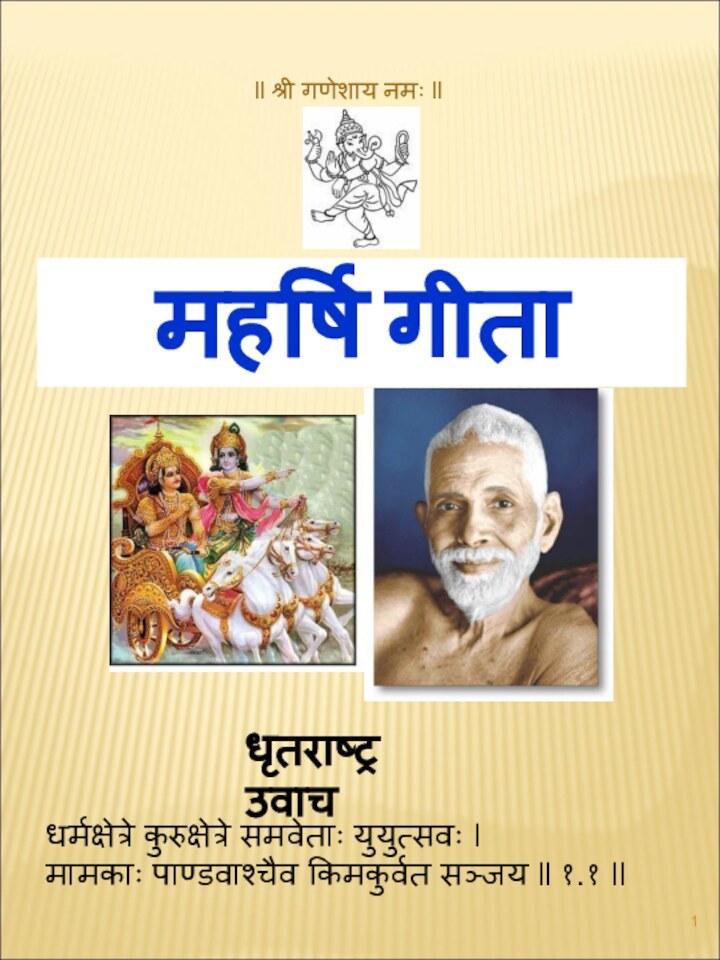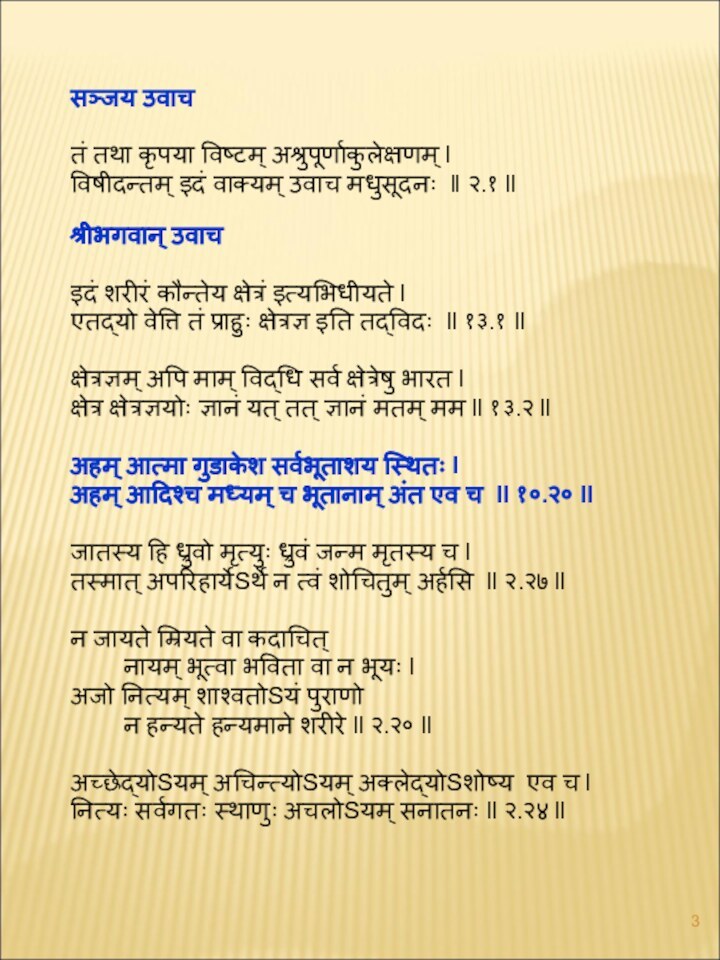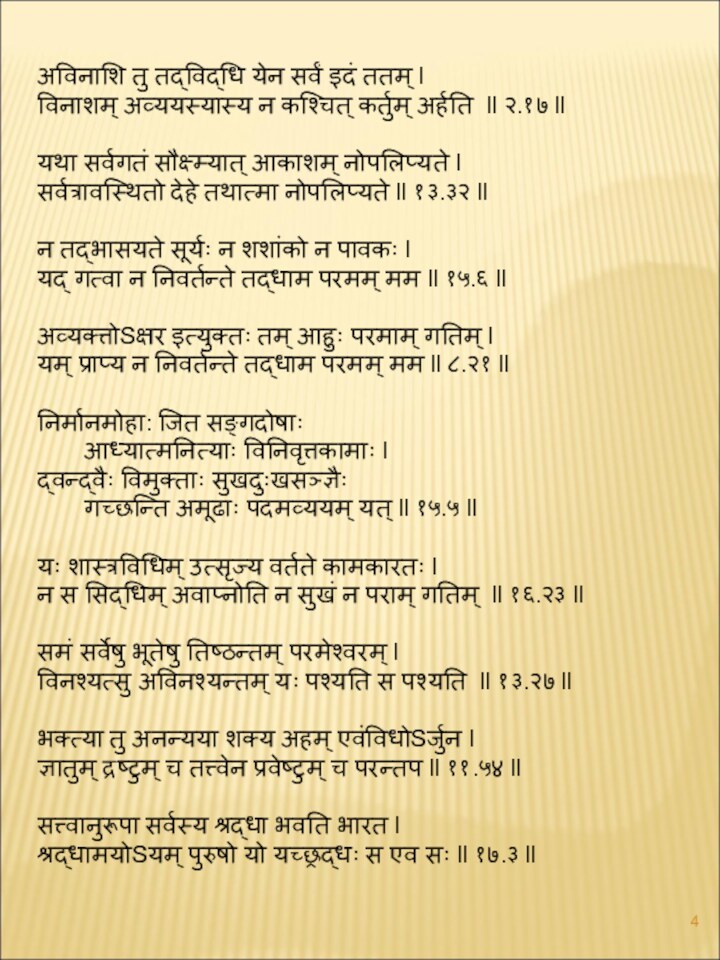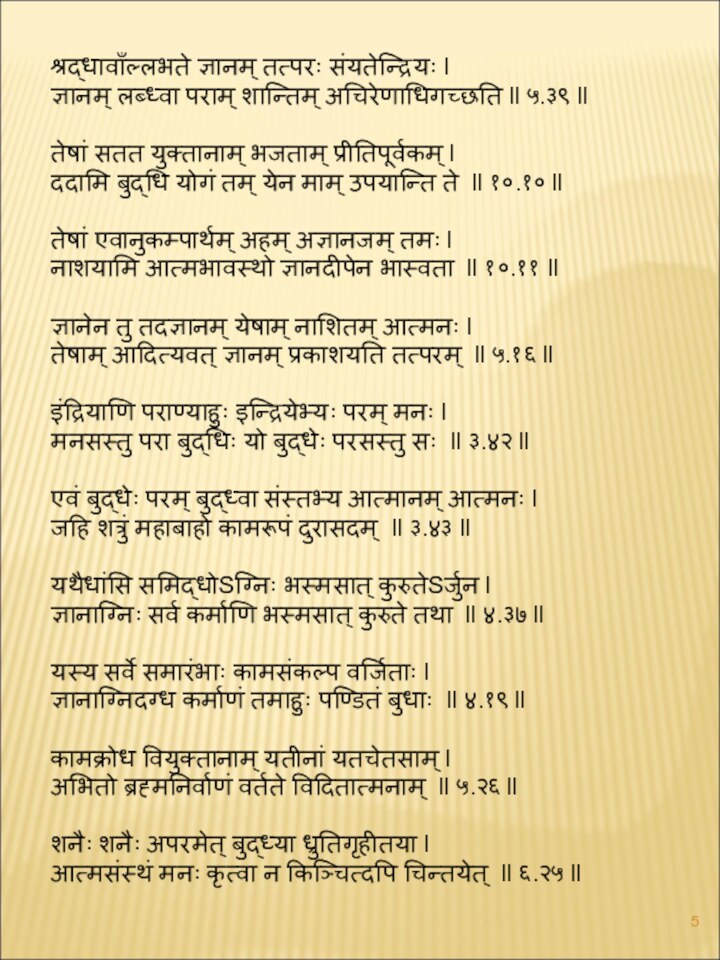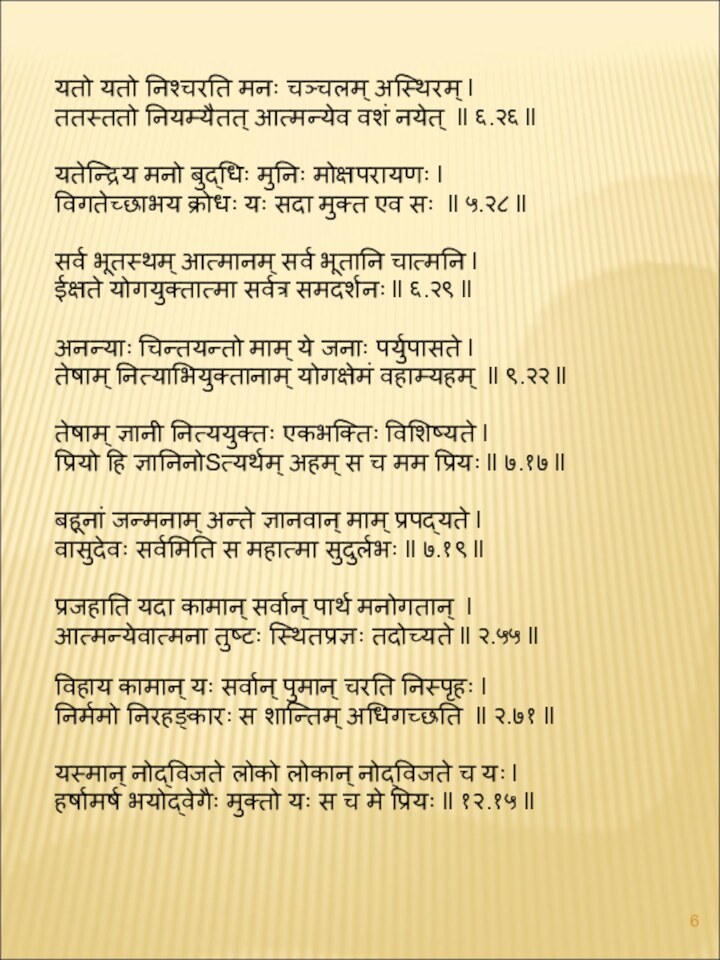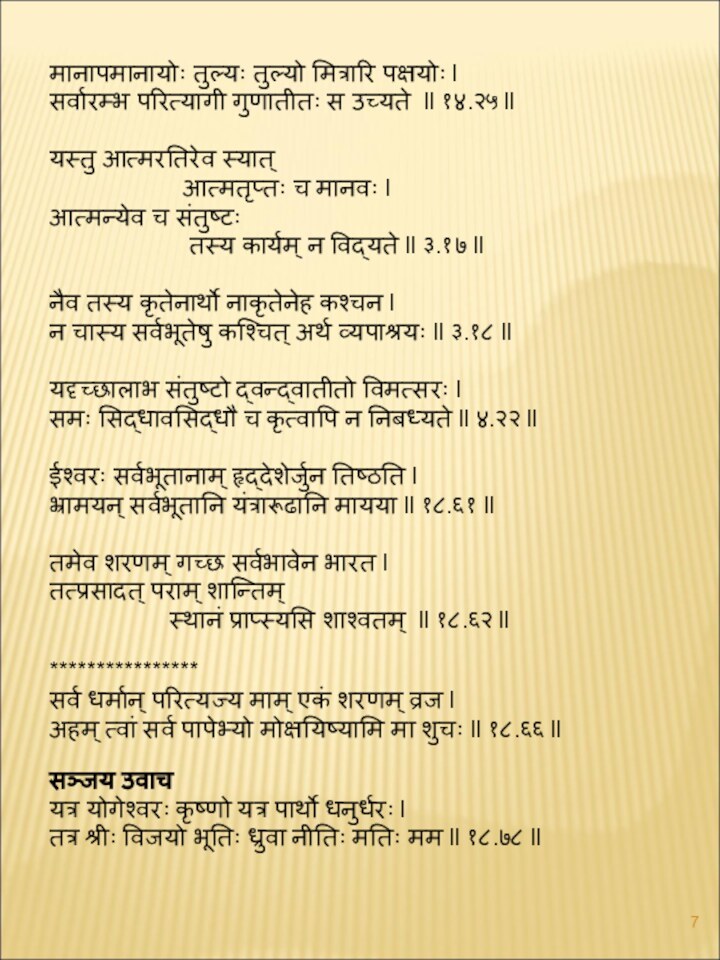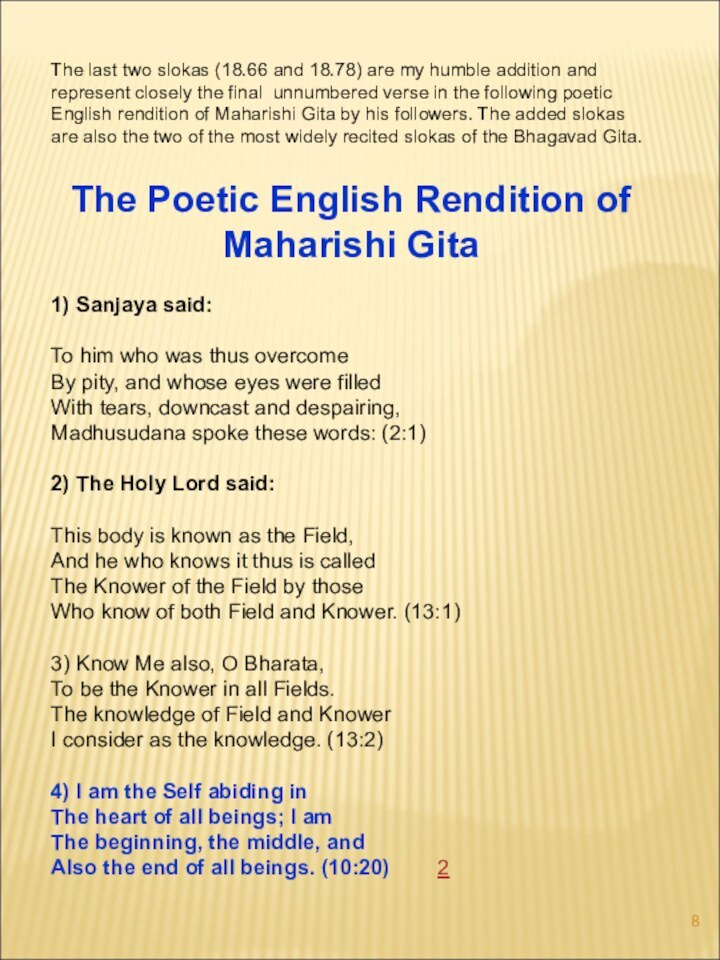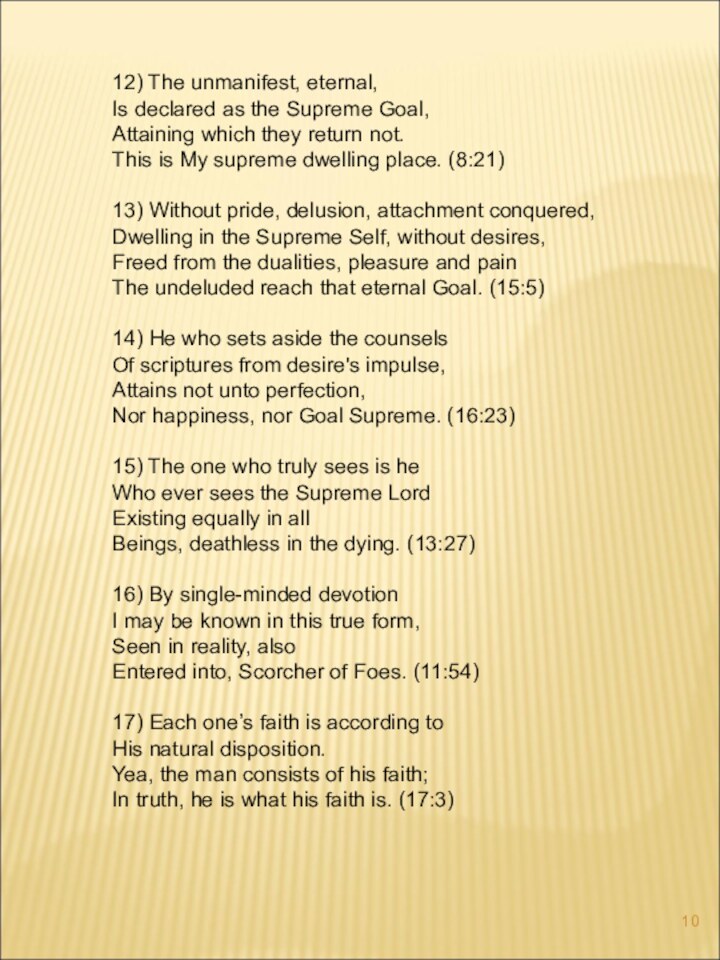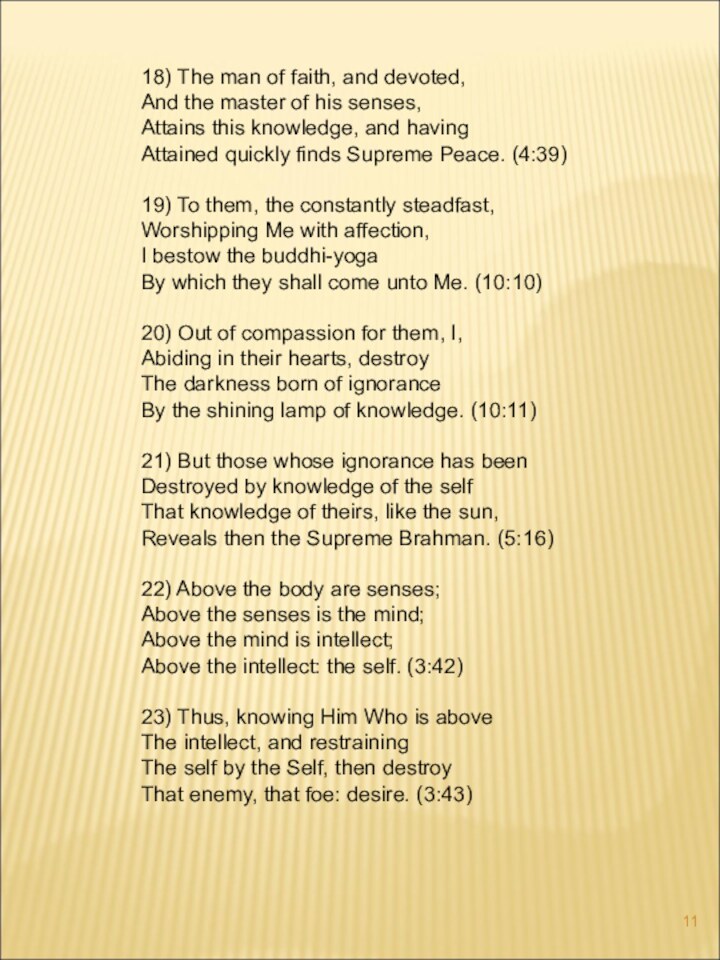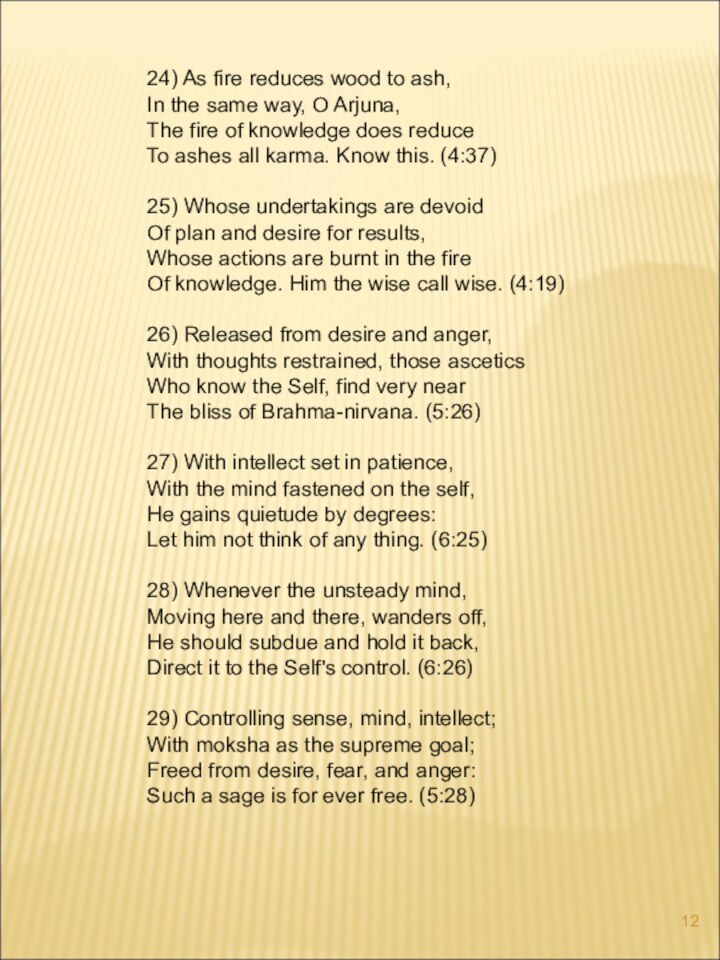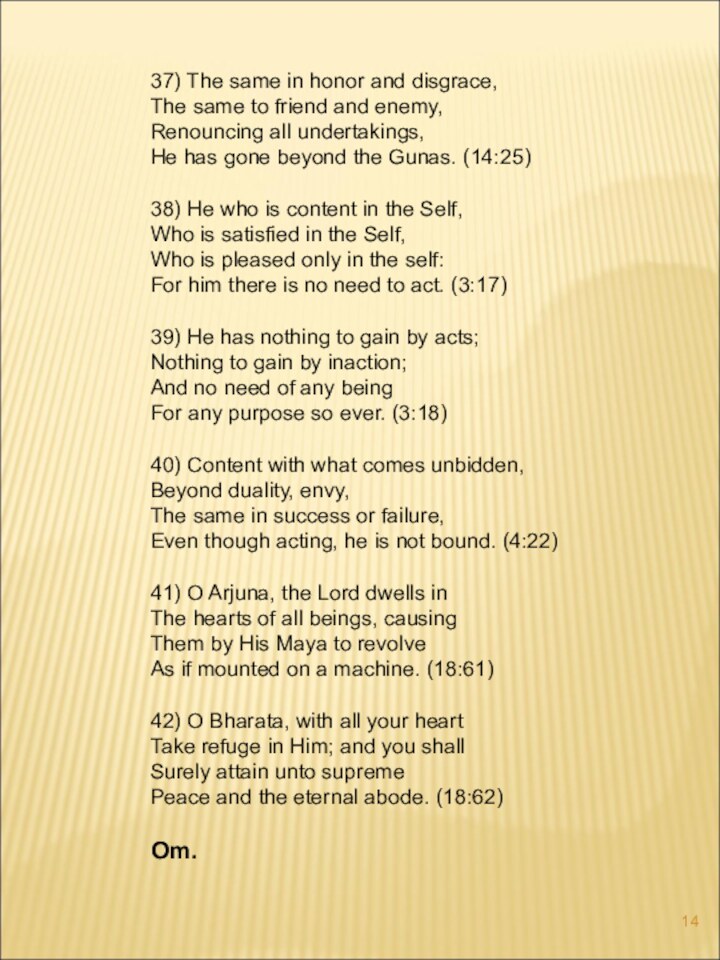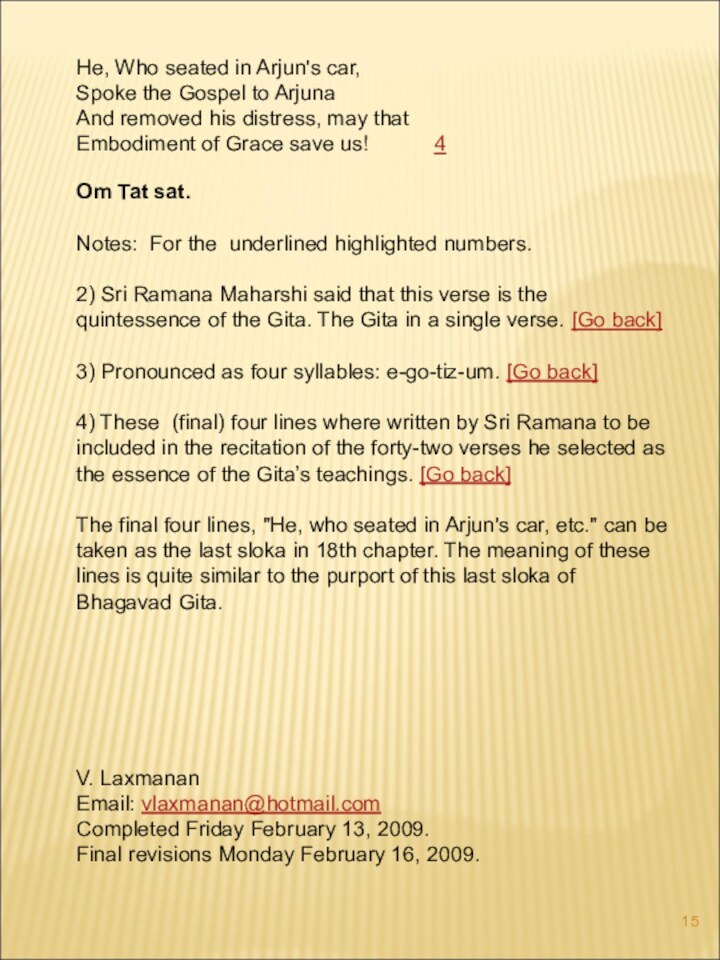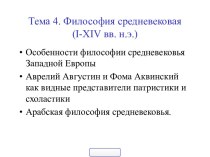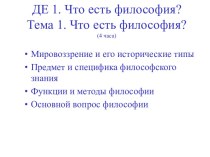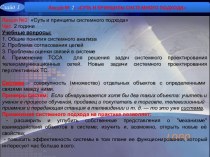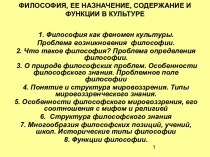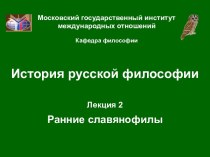Слайд 2
Introduction
This document complies the Sanskrit text of the
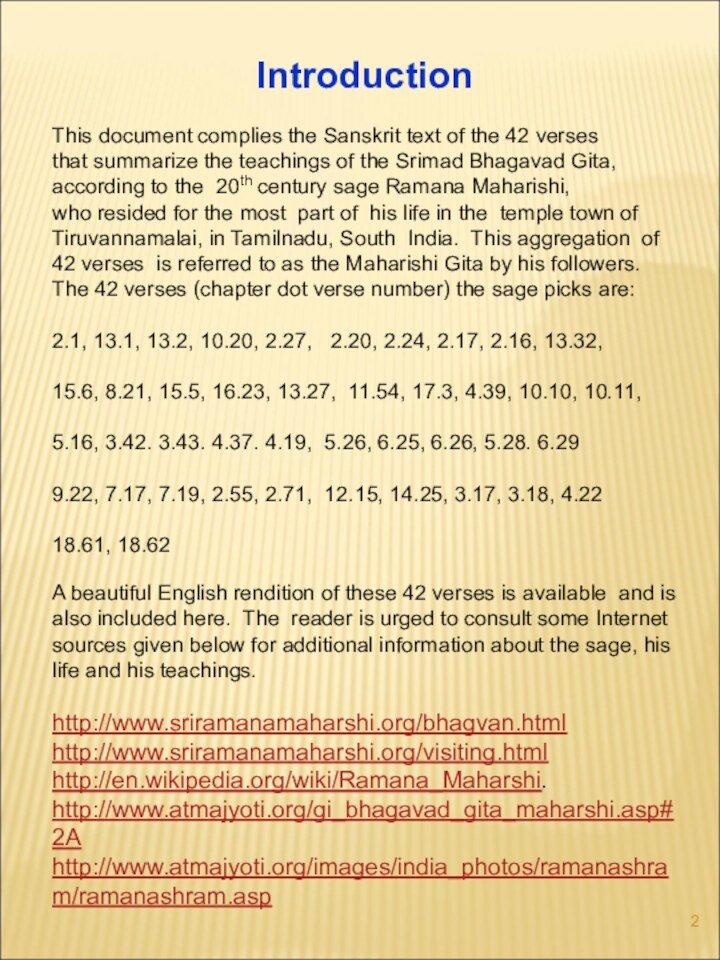
42 verses that summarize the teachings of the Srimad Bhagavad Gita,
according to the 20th century sage Ramana Maharishi, who resided for the most part of his life in the temple town of Tiruvannamalai, in Tamilnadu, South India. This aggregation of 42 verses is referred to as the Maharishi Gita by his followers. The 42 verses (chapter dot verse number) the sage picks are:
2.1, 13.1, 13.2, 10.20, 2.27, 2.20, 2.24, 2.17, 2.16, 13.32,
15.6, 8.21, 15.5, 16.23, 13.27, 11.54, 17.3, 4.39, 10.10, 10.11,
5.16, 3.42. 3.43. 4.37. 4.19, 5.26, 6.25, 6.26, 5.28. 6.29
9.22, 7.17, 7.19, 2.55, 2.71, 12.15, 14.25, 3.17, 3.18, 4.22
18.61, 18.62
A beautiful English rendition of these 42 verses is available and is also included here. The reader is urged to consult some Internet sources given below for additional information about the sage, his life and his teachings.
http://www.sriramanamaharshi.org/bhagvan.html
http://www.sriramanamaharshi.org/visiting.html
http://en.wikipedia.org/wiki/Ramana_Maharshi.
http://www.atmajyoti.org/gi_bhagavad_gita_maharshi.asp#2A
http://www.atmajyoti.org/images/india_photos/ramanashram/ramanashram.asp
Слайд 3
सञ्जय उवाच
तं तथा कृपया विष्टम् अश्रुपूर्णाकुलेक्षणम् l
विषीदन्तम् इदं
वाक्यम् उवाच मधुसूदनः ll २.१ ll
श्रीभगवान् उवाच
इदं शरीरं कौन्तेय क्षेत्रं इत्यभिधीयते
l
एतद्यो वेत्ति तं प्राहुः क्षेत्रज्ञ इति तद्विदः ll १३.१ ll
क्षेत्रज्ञम् अपि माम् विद्धि सर्व क्षेत्रेषु भारत l
क्षेत्र क्षेत्रज्ञयोः ज्ञानं यत् तत् ज्ञानं मतम् मम ll १३.२ ll
अहम् आत्मा गुडाकेश सर्वभूताशय स्थितः l
अहम् आदिश्च मध्यम् च भूतानाम् अंत एव च ll १०.२० ll
जातस्य हि ध्रुवो मृत्युः ध्रुवं जन्म मृतस्य च l
तस्मात् अपरिहार्येSर्थे न त्वं शोचितुम् अर्हसि ll २.२७ ll
न जायते म्रियते वा कदाचित्
नायम् भूत्वा भविता वा न भूयः l
अजो नित्यम् शाश्वतोSयं पुराणो
न हन्यते हन्यमाने शरीरे ll २.२० ll
अच्छेद्योSयम् अचिन्त्योSयम् अक्लेद्योSशोष्य एव च l
नित्यः सर्वगतः स्थाणुः अचलोSयम् सनातनः ll २.२४ ll
Слайд 4
अविनाशि तु तद्विद्धि येन सर्वं इदं ततम् l
विनाशम्
अव्ययस्यास्य न कश्चित् कर्तुम् अर्हति ll २.१७ ll
यथा सर्वगतं
सौक्ष्म्यात् आकाशम् नोपलिप्यते l
सर्वत्रावस्थितो देहे तथात्मा नोपलिप्यते ll १३.३२ ll
न तद्भासयते सूर्यः न शशांको न पावकः l
यद् गत्वा न निवर्तन्ते तद्धाम परमम् मम ll १५.६ ll
अव्यक्त्तोSक्षर इत्युक्तः तम् आहुः परमाम् गतिम् l
यम् प्राप्य न निवर्तन्ते तद्धाम परमम् मम ll ८.२१ ll
निर्मानमोहा: जित सङ्गदोषाः
आध्यात्मनित्याः विनिवृत्तकामाः l
द्वन्द्वैः विमुक्ताः सुखदुःखसञ्ज्ञैः
गच्छन्ति अमूढाः पदमव्ययम् यत् ll १५.५ ll
यः शास्त्रविधिम् उत्सृज्य वर्तते कामकारतः l
न स सिद्धिम् अवाप्नोति न सुखं न पराम् गतिम् ll १६.२३ ll
समं सर्वेषु भूतेषु तिष्ठन्तम् परमेश्वरम् l
विनश्यत्सु अविनश्यन्तम् यः पश्यति स पश्यति ll १३.२७ ll
भक्त्या तु अनन्यया शक्य अहम् एवंविधोSर्जुन l
ज्ञातुम् द्रष्टुम् च तत्त्वेन प्रवेष्टुम् च परन्तप ll ११.५४ ll
सत्त्वानुरूपा सर्वस्य श्रद्धा भवति भारत l
श्रद्धामयोSयम् पुरुषो यो यच्छ्रद्धः स एव सः ll १७.३ ll
Слайд 5
श्रद्धावाँल्लभते ज्ञानम् तत्परः संयतेन्द्रियः l
ज्ञानम् लब्ध्वा पराम् शान्तिम्
अचिरेणाधिगच्छति ll ५.३९ ll
तेषां सतत युक्तानाम् भजताम् प्रीतिपूर्वकम् l
ददामि बुद्धि
योगं तम् येन माम् उपयान्ति ते ll १०.१० ll
तेषां एवानुकम्पार्थम् अहम् अज्ञानजम् तमः l
नाशयामि आत्मभावस्थो ज्ञानदीपेन भास्वता ll १०.११ ll
ज्ञानेन तु तदज्ञानम् येषाम् नाशितम् आत्मनः l
तेषाम् आदित्यवत् ज्ञानम् प्रकाशयति तत्परम् ll ५.१६ ll
इंद्रियाणि पराण्याहुः इन्द्रियेभ्यः परम् मनः l
मनसस्तु परा बुद्धिः यो बुद्धेः परसस्तु सः ll ३.४२ ll
एवं बुद्धेः परम् बुद्ध्वा संस्तभ्य आत्मानम् आत्मनः l
जहि शत्रुं महाबाहो कामरूपं दुरासदम् ll ३.४३ ll
यथैधांसि समिद्धोSग्निः भस्मसात् कुरुतेSर्जुन l
ज्ञानाग्निः सर्व कर्माणि भस्मसात् कुरुते तथा ll ४.३७ ll
यस्य सर्वे समारंभाः कामसंकल्प वर्जिताः l
ज्ञानाग्निदग्ध कर्माणं तमाहुः पण्डितं बुधाः ll ४.१९ ll
कामक्रोध वियुक्तानाम् यतीनां यतचेतसाम् l
अभितो ब्रह्मनिर्वाणं वर्तते विदितात्मनाम् ll ५.२६ ll
शनैः शनैः अपरमेत् बुद्ध्या ध्रुतिगृहीतया l
आत्मसंस्थं मनः कृत्वा न किञ्चित्दपि चिन्तयेत् ll ६.२५ ll
Слайд 6
यतो यतो निश्चरति मनः चञ्चलम् अस्थिरम् l
ततस्ततो नियम्यैतत् आत्मन्येव
वशं नयेत् ll ६.२६ ll
यतेन्द्रिय मनो बुद्धिः मुनिः मोक्षपरायणः
l
विगतेच्छाभय क्रोधः यः सदा मुक्त एव सः ll ५.२८ ll
सर्व भूतस्थम् आत्मानम् सर्व भूतानि चात्मनि l
ईक्षते योगयुक्तात्मा सर्वत्र समदर्शनः ll ६.२९ ll
अनन्याः चिन्तयन्तो माम् ये जनाः पर्युपासते l
तेषाम् नित्याभियुक्तानाम् योगक्षेमं वहाम्यहम् ll ९.२२ ll
तेषाम् ज्ञानी नित्ययुक्तः एकभक्तिः विशिष्यते l
प्रियो हि ज्ञानिनोSत्यर्थम् अहम् स च मम प्रियः ll ७.१७ ll
बहूनां जन्मनाम् अन्ते ज्ञानवान् माम् प्रपद्यते l
वासुदेवः सर्वमिति स महात्मा सुदुर्लभः ll ७.१९ ll
प्रजहाति यदा कामान् सर्वान् पार्थ मनोगतान् l
आत्मन्येवात्मना तुष्टः स्थितप्रज्ञः तदोच्यते ll २.५५ ll
विहाय कामान् यः सर्वान् पुमान् चरति निस्पृहः l
निर्ममो निरहङ्कारः स शान्तिम् अधिगच्छति ll २.७१ ll
यस्मान् नोद्विजते लोको लोकान् नोद्विजते च यः l
हर्षामर्ष भयोद्वेगैः मुक्तो यः स च मे प्रियः ll १२.१५ ll
Слайд 7
मानापमानायोः तुल्यः तुल्यो मित्रारि पक्षयोः l
सर्वारम्भ परित्यागी गुणातीतः
स उच्यते ll १४.२५ ll
यस्तु आत्मरतिरेव स्यात्
आत्मतृप्तः च मानवः l
आत्मन्येव च संतुष्टः
तस्य कार्यम् न विद्यते ll ३.१७ ll
नैव तस्य कृतेनार्थो नाकृतेनेह कश्चन l
न चास्य सर्वभूतेषु कश्चित् अर्थ व्यपाश्रयः ll ३.१८ ll
यदृच्छालाभ संतुष्टो द्वन्द्वातीतो विमत्सरः l
समः सिद्धावसिद्धौ च कृत्वापि न निबध्यते ll ४.२२ ll
ईश्वरः सर्वभूतानाम् हृद्देशेर्जुन तिष्ठति l
भ्रामयन् सर्वभूतानि यंत्रारूढानि मायया ll १८.६१ ll
तमेव शरणम् गच्छ सर्वभावेन भारत l
तत्प्रसादत् पराम् शान्तिम्
स्थानं प्राप्स्यसि शाश्वतम् ll १८.६२ ll
****************
सर्व धर्मान् परित्यज्य माम् एकं शरणम् व्रज l
अहम् त्वां सर्व पापेभ्यो मोक्षयिष्यामि मा शुचः ll १८.६६ ll
सञ्जय उवाच
यत्र योगेश्वरः कृष्णो यत्र पार्थो धनुर्धरः l
तत्र श्रीः विजयो भूतिः ध्रुवा नीतिः मतिः मम ll १८.७८ ll
Слайд 8
The last two slokas (18.66 and 18.78) are my humble
addition and represent closely the final unnumbered verse in
the following poetic English rendition of Maharishi Gita by his followers. The added slokas are also the two of the most widely recited slokas of the Bhagavad Gita.
The Poetic English Rendition of
Maharishi Gita
1) Sanjaya said:
To him who was thus overcome
By pity, and whose eyes were filled
With tears, downcast and despairing,
Madhusudana spoke these words: (2:1)
2) The Holy Lord said:
This body is known as the Field,
And he who knows it thus is called
The Knower of the Field by those
Who know of both Field and Knower. (13:1)
3) Know Me also, O Bharata,
To be the Knower in all Fields.
The knowledge of Field and Knower
I consider as the knowledge. (13:2)
4) I am the Self abiding in
The heart of all beings; I am
The beginning, the middle, and
Also the end of all beings. (10:20) 2
Слайд 9
5) Of that which is born, death is
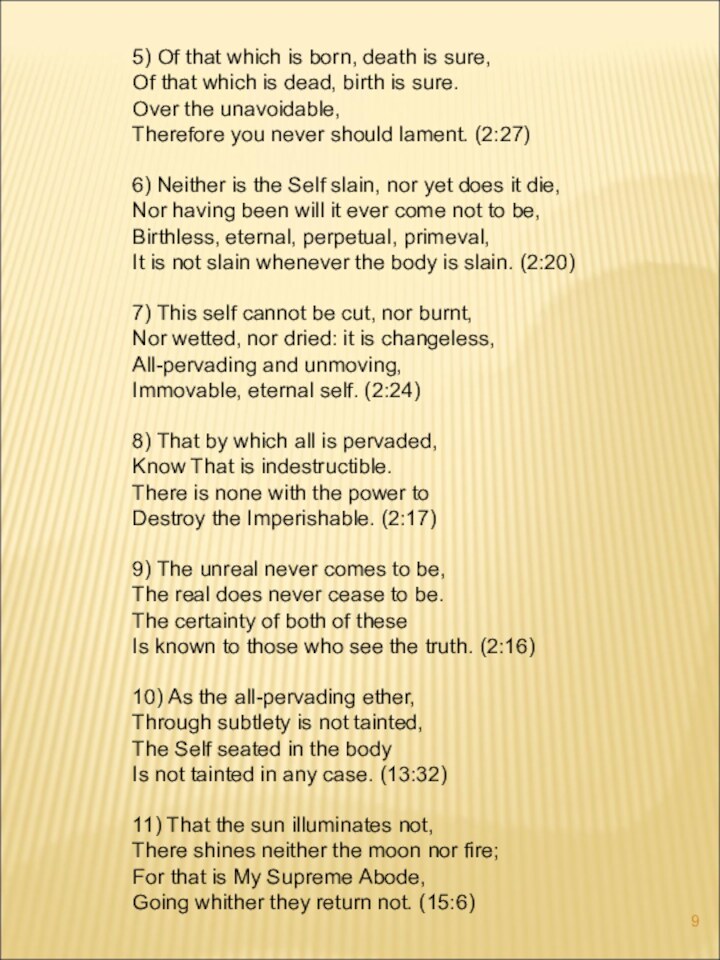
sure,
Of that which is dead, birth is sure.
Over
the unavoidable,
Therefore you never should lament. (2:27)
6) Neither is the Self slain, nor yet does it die,
Nor having been will it ever come not to be,
Birthless, eternal, perpetual, primeval,
It is not slain whenever the body is slain. (2:20)
7) This self cannot be cut, nor burnt,
Nor wetted, nor dried: it is changeless,
All-pervading and unmoving,
Immovable, eternal self. (2:24)
8) That by which all is pervaded,
Know That is indestructible.
There is none with the power to
Destroy the Imperishable. (2:17)
9) The unreal never comes to be,
The real does never cease to be.
The certainty of both of these
Is known to those who see the truth. (2:16)
10) As the all-pervading ether,
Through subtlety is not tainted,
The Self seated in the body
Is not tainted in any case. (13:32)
11) That the sun illuminates not,
There shines neither the moon nor fire;
For that is My Supreme Abode,
Going whither they return not. (15:6)
Слайд 10
12) The unmanifest, eternal,
Is declared as the Supreme
Goal,
Attaining which they return not.
This is My supreme
dwelling place. (8:21)
13) Without pride, delusion, attachment conquered,
Dwelling in the Supreme Self, without desires,
Freed from the dualities, pleasure and pain
The undeluded reach that eternal Goal. (15:5)
14) He who sets aside the counsels
Of scriptures from desire's impulse,
Attains not unto perfection,
Nor happiness, nor Goal Supreme. (16:23)
15) The one who truly sees is he
Who ever sees the Supreme Lord
Existing equally in all
Beings, deathless in the dying. (13:27)
16) By single-minded devotion
I may be known in this true form,
Seen in reality, also
Entered into, Scorcher of Foes. (11:54)
17) Each one’s faith is according to
His natural disposition.
Yea, the man consists of his faith;
In truth, he is what his faith is. (17:3)
Слайд 11
18) The man of faith, and devoted,
And the
master of his senses,
Attains this knowledge, and having
Attained quickly
finds Supreme Peace. (4:39)
19) To them, the constantly steadfast,
Worshipping Me with affection,
I bestow the buddhi-yoga
By which they shall come unto Me. (10:10)
20) Out of compassion for them, I,
Abiding in their hearts, destroy
The darkness born of ignorance
By the shining lamp of knowledge. (10:11)
21) But those whose ignorance has been
Destroyed by knowledge of the self
That knowledge of theirs, like the sun,
Reveals then the Supreme Brahman. (5:16)
22) Above the body are senses;
Above the senses is the mind;
Above the mind is intellect;
Above the intellect: the self. (3:42)
23) Thus, knowing Him Who is above
The intellect, and restraining
The self by the Self, then destroy
That enemy, that foe: desire. (3:43)
Слайд 12
24) As fire reduces wood to ash,
In the
same way, O Arjuna,
The fire of knowledge does
reduce
To ashes all karma. Know this. (4:37)
25) Whose undertakings are devoid
Of plan and desire for results,
Whose actions are burnt in the fire
Of knowledge. Him the wise call wise. (4:19)
26) Released from desire and anger,
With thoughts restrained, those ascetics
Who know the Self, find very near
The bliss of Brahma-nirvana. (5:26)
27) With intellect set in patience,
With the mind fastened on the self,
He gains quietude by degrees:
Let him not think of any thing. (6:25)
28) Whenever the unsteady mind,
Moving here and there, wanders off,
He should subdue and hold it back,
Direct it to the Self's control. (6:26)
29) Controlling sense, mind, intellect;
With moksha as the supreme goal;
Freed from desire, fear, and anger:
Such a sage is for ever free. (5:28)
Слайд 13
30) He, disciplined by yoga, sees
The Self present
in all beings,
And all beings within the Self.
He sees
the same Self at all times. (6:29)
31) Those who direct their thoughts to Me,
Worshipping Me with steadfast mind,
For them I secure what they lack
And preserve that which they possess. (9:22)
32) Of them, the wise man, ever steadfast,
Devoted to the One, excels;
Supremely dear am I to him,
And he is dear to Me, as well. (7:17)
33) At the end of his many births
The wise man takes refuge in Me.
He knows: All is Vasudeva.
How very rare is that great soul! (7:19)
34) When he completely casts away
All the desires of the mind,
His self satisfied by the self,
He is called of steady wisdom. (2:55)
35) He who abandons all desires
Attains peace, acts free from longing,
Indifferent to possessions
And free from all egotism. 3 (2:71)
36) He who agitates not the world,
And whom the world agitates not,
Who is freed from joy, envy, fear,
And worry, he is dear to Me. (12:15)
Слайд 14
37) The same in honor and disgrace,
The same
to friend and enemy,
Renouncing all undertakings,
He has gone beyond
the Gunas. (14:25)
38) He who is content in the Self,
Who is satisfied in the Self,
Who is pleased only in the self:
For him there is no need to act. (3:17)
39) He has nothing to gain by acts;
Nothing to gain by inaction;
And no need of any being
For any purpose so ever. (3:18)
40) Content with what comes unbidden,
Beyond duality, envy,
The same in success or failure,
Even though acting, he is not bound. (4:22)
41) O Arjuna, the Lord dwells in
The hearts of all beings, causing
Them by His Maya to revolve
As if mounted on a machine. (18:61)
42) O Bharata, with all your heart
Take refuge in Him; and you shall
Surely attain unto supreme
Peace and the eternal abode. (18:62)
Om.
